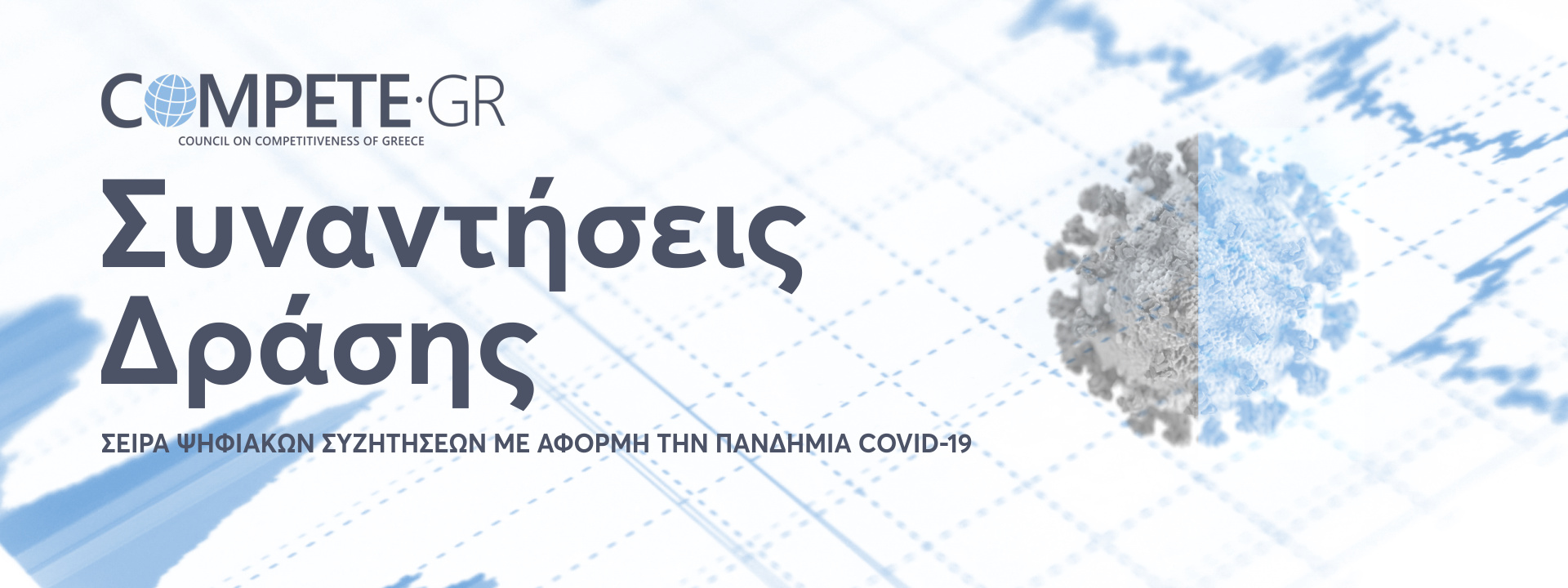KNOWLEDGE SESSIONS – ACTIONABLE DISCUSSIONS
In response to the COVID-19 pandemic, the Council on Competitiveness for Greece (CompeteGR), has been organizing biweekly online knowledge sessions featuring representatives of its member companies, various associations and academia as well as other friends of the Council to discuss specific issues and put forth opinions and proposals.
Each session begins with a brief statement from Council President Mr. Simos Anastasopoulos, followed by a presentation, by Council Executive Director Dr. Venetia Koussia, on Greece’s competitive position according to international reports, and a brief introduction on each of the session’s topics by a knowledgeable and distinguished speaker.
Wednesday, 10 June, 2020
Secondary Sector: Prospects and Role in the GDP
Athanasios Savvakis, Secretary General of CompeteGR and President of the Federation of Industries of Greece
Michael Stassinopoulos, founding member of CompeteGR and President of Hellenic Production
Dimitris Papastergiou, Mayor of the Municipality of Trikala and President of the Central Union of Municipalities of Greece
Ioannis Tserepas, Vice President of the Association of Thessaloniki Enterprises and Industrial
With thanks to George Mylonas (Alumil), Alexandros Angelopoulos (Aldemar Hotels & Spa), Georgios Filiopoulos (Enterprise Greece), Dr. Christos Ioannou (SEV-Hellenic Federation of Enterprises), Dr. Petros Doukas (Mayor of Sparti), Konstantinos Koukountzos (Kleemann), Dr. George Handjinicolaou (Chairman of the Board of Directors of Piraeus Bank and Vice President of CompeteGR), Prof. Panos Tsakloglou (University of Athens), and Vassilis Kafatos (Deloitte), Chair of CompeteGR’s Advisory Board.
According to the global competitiveness reports (WEF, IMD, World Bank, etc.) often cited on CompeteGR.org, in the “Greek competitiveness ranking” section of the homepage, there are a number of factors that affect on the one hand the expansion of the secondary sector and on the other hand its orientation towards producing exportable goods. These factors affect competitiveness indices and concern a broad range of activities. Some of the key factors that we must pay particular attention to include the entrepreneurial ecosystem, technical (111/140)schools quality and diversity of workforce (123/140), labor market flexibility (110/140), as well as human resources/workforce development (leave it as is), research and innovation with multi-stakeholder collaboration (123/140), state of cluster development (127/140), property rights(107/140), quality of land administration (135/140), baseline water stress (113/140), and efficiency of train services (77/140). Should we have a Competitiveness Observatory to overview and consult on each new piece of legislation?
COVID-19 has created opportunities to deal with many long-standing issues (e.g. in the labor market) quickly and to anchor these solutions within a stable framework that ensures they are upheld for years to come.
Of course, we need to revisit the National Strategy for the Industrial Sector in order to equip ourselves with up-to-date risk management tools and produce proposals that take into account the Green Deal, adhering to the UN’s 17 Sustainable Development Goals and taking the necessary measures to avoid increasing costs.
To move away from producing low value goods (commodities), we must carry out a thorough analysis of both our strengths and weaknesses and determine what it is we must stop doing. It is sometimes necessary to remove things in order to improve upon those things that you keep and prioritize. This is a responsibility we all share in: the state, business, and the workforce. And of course, we must also decide on the level of quality we want in the value chain.
The battle of ideas and public opinion must be won to allow processing to claim a larger role in GDP and the labor force, resulting in a GDP that grows through collaboration, rather than conflict, between sectors. There must be a separate plan for processing, one that is in line with European priorities on green and digital development, health, and social cohesion.


 Programs & Events
Programs & Events Engage with the Council
Engage with the Council Our Blog
Our Blog Contact us
Contact us
